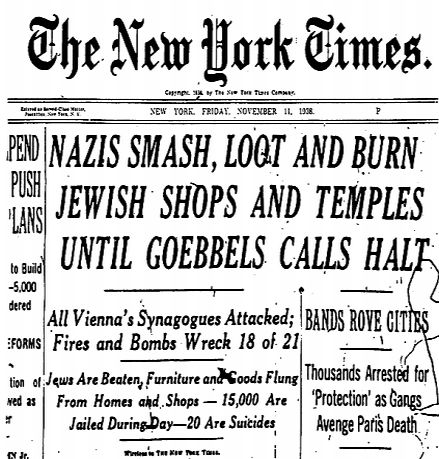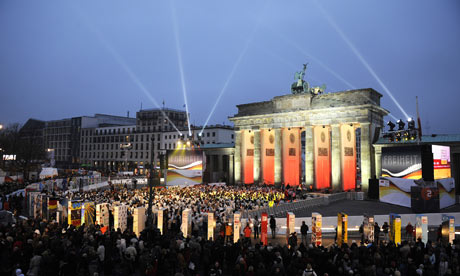
Tourists look at individually-painted dominoes along the former route of the Berlin Wall at the Brandenburg Gate. |
World leaders joined German crowds on Monday to celebrate the 20th anniversary of the fall of the Berlin Wall - a stark symbol of the Cold War that divided a city and a continent.
Recollections of November 9, 1989 dominated German newspaper headlines at the weekend, and television stations ran program after program of documentary footage, eyewitness accounts and discussion panels about the event that changed the face of Europe.
And while thousands of tourists have poured into the capital to mark the event which hastened the reunification of Germany, the collapse of the Iron Curtain and the end of the Soviet Union, many have chosen to overlook another event that changed the face of Germany and Europe that also happened on the 9th of November..
Kristallnacht or "Night of Broken Glass"
| "Kristallnacht" is a German word that consists of two parts: "Kristall" translates to "crystal" and refers to the look of broken glass and "Nacht" means "night." The accepted English translation is the "Night of Broken Glass." |
The most infamous Anti-Semitic Pogrom in recent history occurred on November 9, 1938. Instigated primarily by Nazi party officials and the SA (Nazi Storm Troopers), the pogrom occurred throughout Germany (including annexed Austria and the Sudetenland region of Czechoslovakia). The name Kristallnacht has its origin in the untold numbers of broken windows of synagogues, Jewish-owned stores, community centers, and homes plundered and destroyed during the pogrom. Read more about Kristalnact [here]
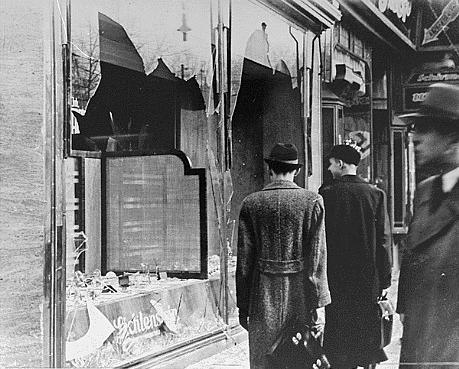
Shattered windows the day after Kristallnacht |
The actions that occurred that night in 1938 culminated in a meeting on the 12th of November, chaired by Hermann Göring who made the following statement:
I have received a letter written on the Fuehrer's orders requesting that the Jewish question be now, once and for all, coordinated and solved one way or another." The path to the “Final Solution” has now been chosen. And, all the bureaucratic mechanisms for its implementation were now in place.
The point of comparison of the events that occurred on November 9th of both 1938 and 1989 is in no way intended to minimize or trivialize the significance of either of these dates on world history...
However many decades later, association with the Kristallnacht anniversary was cited as the main reason against choosing November 9, the day the Berlin Wall came down in 1989, as the new German national holiday; a different day was chosen (October 3, 1990 as the new German reunification day).
This is not to say that Kristallnact has been forgotten... In fact all over Europe hundreds of commemoration and protest activities have been organized on November 9 1997, International Day Against Fascism and Anti-Semitism. The biggest demonstration took place in Yugoslavia. Between 1.000 and 3.000 people marched in the streets of Belgrade to protest against the on-going violence against Roma in their country.
In Essen 1.000 anti-fascists marched in protest against fascist violence. In the Netherlands activities took place in 11 cities all over the country in many different ways, but mainly comparing the situation of refugees in 1938 and in 1997.
The European network against nationalism, racism, fascism and in support of migrants and refugees or "UNITED for Intercultural Action" has distributed 20.000 stickers and 5.000 information leaflets explaining the history of "Kristallnacht", the purpose of the commemorations and giving examples of racist practices in Europe. The secretariat has sent out several press releases and numerous lists of activities. International journalists have been referred to specific organizations for more in depth information. The information has been spread widely through the Internet as well.
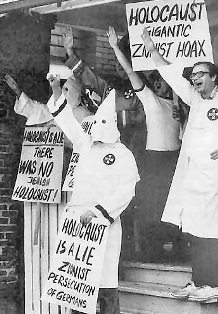
Holocaust Denial & Protest |
But how the comparison of 1938 and 1989 does raise some questions on how history can and should be reviewed, is the elevation of importance, or the choice of governments to proselytize some some events on history in itself a form of masked revisionism?
Within historiography, that is part of the academic field of history, historical revisionism is the reinterpretation of orthodox views on evidence, motivations, and decision-making processes surrounding a historical event.
The revisionist assumes the interpretation of a historical event or period, as accepted by the majority of scholars, needs significant change. In the case of Holocaust revisionism, or Holocaust denial is the claim that the genocide of Jews during World War II, usually referred to as the Holocaust, did not occur at all, or that it did not happen in the manner or to the extent historically recognized.
Key elements of this claim are the rejection of any of the following: that the German Nazi government had a policy of deliberately targeting Jews for extermination as a people; that more than five million Jews were systematically killed by the Nazis and their allies; and that genocide was carried out at extermination camps using tools of mass murder, such as gas chambers.
Holocaust deniers do not accept the term "denial" as an appropriate description of their point of view, and use the term Holocaust revisionism instead. Scholars use the term "denial" to differentiate Holocaust deniers from historical revisionists, who use established historical methodologies.
Although the number of active Holocaust denier authors is small, during certain periods they have been able to attract attention that is grossly out of proportion to their numbers and the level of their scholarship. Under the guise of a reasonable person's search for truth, Holocaust deniers spread falsehoods and misinformation that appears reasonable to the uninformed reader.
Often times they claim the mantle of free-speech saying they are for “continued research” into a “complex” and “misrepresented” history; yet, their method is never truly historical. Many deniers do not rely on artifacts or documentary evidence to create their hypotheses, instead they develop a history of opinion in which any manipulation or distortion of history is acceptable as one’s personal belief.
Today the Holocaust is widely memorialized as a seminal event in the history of Western civilization. But the means are sometimes criticized. Washington DC’s Holocaust memorial has been one bone of contention, and in contrast to the Holocaust Revisionism movement, a new breed of Holocaust "Revisionist Debunkers" has arisen.
Professor Yehuda Bauer Holocaust scholar and author of Rethinking the Holocaust, and an advisor on the creation of the USHMM in Washington makes the point of avoiding the term ‘unique’ in reference to the Holocaust. But if there was nothing quite like it before or since, why does Bauer shy away from it?
"Every historical event is unique," he explains carefully. "It cannot be cloned exactly. So when I say ‘unique’, it stands completely apart from any kind of similar genocide attack, which is not true.
When I say ‘unprecedented’, I mean that it never happened like that before but because it happened like that during World War II, it can happen again. What has happened can be repeated. The Holocaust had no precedent, but it is a precedent."
In the 1990s, the growth of the Internet produced many conspiracy theory sites. Claims that the Holocaust did not exist, or did not exist on the scale claimed have been widely made on some conspiracy theory websites, many of which have blamed Jewish conspiracies for a range of issues, including the attack on the World Trade Center, the communist revolution, and AIDS.
Recently the terms Holocaust Industry and Shoah Business have come into vogue among Holocaust revisionists to express their perception that Jewish leaders promote the official story about the Holocaust for financial and political gain.
A number of authority figures stated publicly that the Internet allowed hate groups to introduce their messages to a widespread audience, and it was feared that Holocaust revisionism would gain in popularity as a result.
However we've also witnessed the evolution of the revisionist counter movement or "Holocaust Revisionist Debunkers" and if
you think the Holocaust Deniers seemed kooky or paranoid in their methods, then the "Debunkers"
can be simply downright psychotic in the way they approach the debate.
Renowned Holocaust Scholar Chris Webb made the following comment on "Holocaust Debunkers" in an editorial published by the Holocaust Education & Archive Research Team:
"Visiting some of these web sites one is struck by the enormous amount of wasted effort, both in terms of arguing with Deniers, who will never change their particular view, unless some “ultimate proof” is provided, and the Deniers spending their time, peddling their seemingly senseless viewpoints, happy to be engaged in ‘debate.’
In addition, those self proclaimed “Debunkers” of revisionist theories are in many ways no different than the Deniers themselves. Most are only seeking a conflict or debate to engage in, and debunking revisionism affords them some sort of “moral high ground” to do it from."
In my own experience most of the "Debunking" tends to occur on conspiracy websites or "cheesy blogs" which specifically attempt to design there look and feel with an intent to perpetrate an air of credibility, and scholarship. They do this by associating themselves with respected Internet sites via web-links or reference quotes, despite the fact they often intersperse these links among paragraphs of profanity, name calling, threats and disparaging comments.
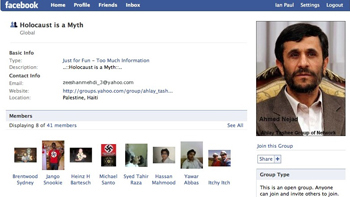
Image from a Holocaust Denial profile on Facebook |
It is believed that some of these Holocaust Controversy type blogs are in fact supported by Neo-Nazi organizations with the sole purpose of subterfuge, false propaganda and personal attacks.
Often we find when one is exposed to the level of vitriol spewed by "Deniers" they are shocked to see the equivalent or worse form of diatribes disgorged by the "Debunkers" on the controversy blogs, hate forums, email bulletins, and YouTube videos.
On the topic of Holocaust Denial, Debunking or Debate, members of The Holocaust Education & Archive Research Team made the following comment:
Whilst many “Self-Proclaimed Debunkers of Revisionism” believe they are doing something noble by “giving the Deniers a hard time” you are in essence accomplishing nothing but validating that a ludicrous revisionist viewpoint has any merit what so ever.
Forcing Holocaust Deniers to lose composure doesn't discredit the Denier. It simply proves the Denier is just as human as the rest of us and can react adversely when challenged.
(We would remind all that the Holocaust isn't a game where points are awarded to whichever side makes a better argument. Millions died in unimaginable suffering. If you need to play a game that proves your intellect we would recommend a friendly game of Chess perhaps?)
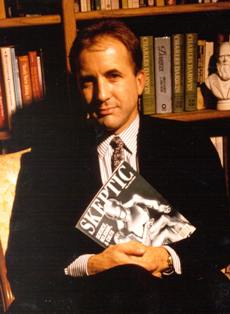
Dr. Michael Shermer is the Founding Publisher of Skeptic magazine, a skeptic of the Holocaust deniers |
It is the view of the Holocaust Education & Archive Research Team that the period of history known as the Holocaust [Shoah], the program of systematic state-sponsored extermination by Nazi Germany, under Adolf Hitler, and its collaborators towards the Jewish peoples in Europe but also including ethnic Poles, the Romani, Soviet civilians, Soviet prisoners of war, people with disabilities, gay men, and political and religious opponents can NEVER BE DENIED.
Any claim that the Shoah never happened, that the resources of the Third Reich never murdered almost a million Jews and political opponents in mass shootings. That entire communities of Jews and Romani were not crammed into ghettos before being transported by freight train to extermination camps where, if they survived the journey, the majority of them were killed in gas chambers is a claim designed purely to stir controversy.
Validating the arguments of Holocaust Deniers via anonymous online debates offers no value to the cause of Holocaust remembrance and no value to history or posterity. We believe that energy is better spent promoting Holocaust awareness for the future benefit of society and cultures worldwide. So mankind won't forever be doomed to repeat the evils of the past. [http://blog.holocaustresearchproject.org/FeaturedComments.aspx]
(Personally I agree with this comment...)
So in conclusion...
Does it matter that so often more emphasis was made by governments and the media to celebrate the fall of the Berlin wall this past November 9th, with little, if any, mention of Kristallnacht?
Is debating the Holocaust becoming more important than memorializing the victims? Are the "Debunkers" any different than the "Deniers" because they appear to take the moral high ground? Certainly if you ask members of each of these movements you will hear compelling arguments that support their respective cause.
But I think it was the anonymous Internet poster who summed it up best with the comment:
"The Holocaust is a fact that can be neither debated or denied!"
When you really think about it, what more
truly need be said?
-Martin Friedhaus
Sources:
Denying the Holocaust: The Growing Assault on Truth and Memory. Deborah Lippstadt Free Press Macmillan, 1993
Holocaust Denial & Debunking: Chris Webb http://www.holocaustresearchproject.org/essays&editorials/deniers&debunkers.html
Brandenburg Gate Photograph: Axel Schmidt/AFP/Getty Images
Holocaust Denial On Trial: http://www.hdot.org/en/denial
Debunking the Deniers Essay: David Mandel - Australia/Israel & Jewish Affairs Council
Beyond Belief: The American Press and the Coming of the Holocaust. Deborah Lippstadt Free Press/Macmillan, 1993.

